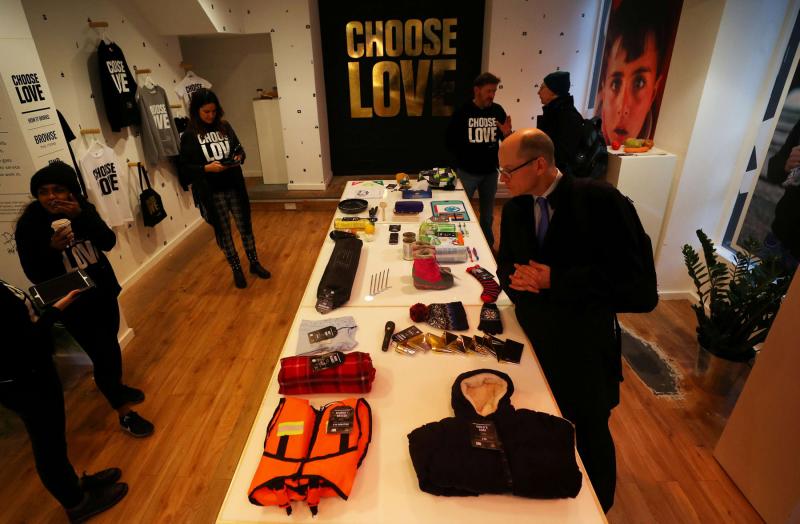On Black Friday, November 22, an unusual shopping experience was offered to Londoners. A pop-up store, set up by a charity in the heart of the British capital, gave shoppers the chance to buy gifts for refugees.
People could choose from a range of products a refugee might find useful — relief items such as sleeping bags, emergency blankets and solar lamps — or they could pay upfront for longer-term practical help such as legal support.
By splitting the store into three areas, the Help Refugees charity tried to convey a sense of the stages of a refugee’s journey: survival, shelter and the future. Emergency blankets were about survival; the purchase of legal help for the asylum process or family reunion was an investment in a refugee’s future.
What’s all of that about one might ask, especially in Britain, where concerns about immigration, foreigners and refugees were a key driver of the 2016 vote to leave the European Union. As of last April, the United Kingdom had taken in a little more than 10,000 Syrian refugees over two-and-a-half years.
That number, incidentally, is considered so small that late last year, a senior official of the UN refugee agency publicly expressed hope Britain would make a “step change [by] doubling” its annual refugee intake.
In that context, the idea of Help Refugees’ pop-up shop seems as transient as its physical manifestation. Was the shop and its eager customers a one-off heart-warming gesture in tune with the Christmas season’s charitable impulses or might it be the harbinger of a subtle shift in the fraught conversation over refugees?
There are indications that change is in the air. After video of an attack on a 15-year-old Syrian refugee in north-western England went viral, the outrage was swift and from unexpected quarters.
On November 28, Nadine Dorries, a Conservative MP who has previously linked London Mayor Sadiq Khan to Muslim sexual predators, called for “love and acceptance” of refugees. Zac Goldsmith, a Conservative MP who once made spurious connections between Khan and Islamist extremists, described the video as “heartbreaking.” Tobias Ellwood, a member of the Conservative government, said the attack was an “absolute disgrace” though that tweet was subsequently deleted. Ellwood has voted in parliament to shut a sanctuary scheme for young Syrian refugees.
In broad terms, too, Britons seem to be more sympathetic towards refugees and migrants than a year ago. Going by the Aurora Humanitarian Index, which surveys public opinion in 12 countries, British people say they feel the refugee’s distress more acutely.
In its survey of 1,053 Britons, the index said 52% of respondents said they were in favour of more UK government support for refugees and 38% expressed regret that too little was being done.
Although relatively new (having started in 2016), the Aurora Humanitarian Index may be a useful measure of public opinion on humanitarian initiatives. It is emotionally connected to the issues at hand, being part of a slew of initiatives by an Armenian foundation that seeks to highlight the generosity of strangers towards those in peril, not least Armenian survivors of the 1915 genocide. The foundation counts actor George Clooney, Ireland’s former President Mary Robinson, former Mexican President Ernesto Zedillo and former US Ambassador to the United Nations Samantha Power among its active supporters.
Is a recalibration of attitudes to refugees under way in Britain then and might it help change the discourse in other parts of the world? “Placeless People: Writing, Rights and Refugees,” a new book by British professor Lyndsey Stonebridge, argues there is a need to return to the moment when the meanings of exile — refugeehood and statelessness — changed from heroic to threatening, from an imperative to act to an imposition to be fended off.
When was that moment? Certainly well after the 1951 Geneva Convention, which defined the status of refugees, set out the rights of individuals granted asylum and the responsibilities of nations.
It was not until 1967 that the convention embraced a broader definition of “refugee” than just the Europeans displaced by conflict and violence before January 1, 1951, and it was only in the 1990s that asylum policy in the United States — leader of the “free world” — started to pick and choose among desperate asylum seekers: Cubans were privileged for political reasons; Haitians were not.
As Stonebridge notes, two categories of refugee emerged out of the mid-20th century, “the political exile, often assumed to be European, carrying with them ‘fascist or communist persecution, heroism, and escape,’ and ‘non-European refugees, most of them left outside the scope of the international refugee regime.”
The latter, she adds, were “scooped into the humanitarian (at best) no-man’s land of potential and sometimes permanent statelessness.”
In 1944, the political philosopher and refugee Hannah Arendt wrote: “Everywhere the word ‘exile,’ which once had an undertone of almost sacred awe, now provokes the idea of something simultaneously suspicious and unfortunate.”
In 2018, Arendt sounds almost like a TV pundit, albeit with better analysis.


